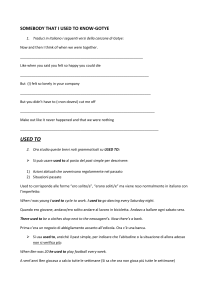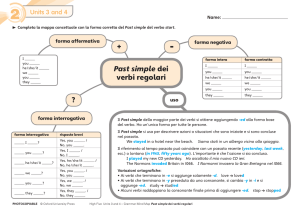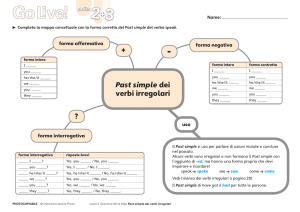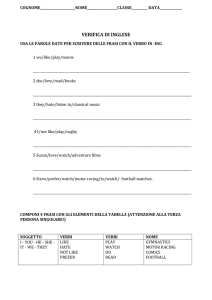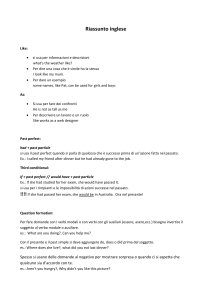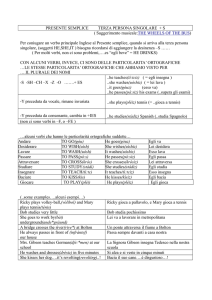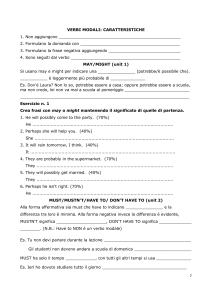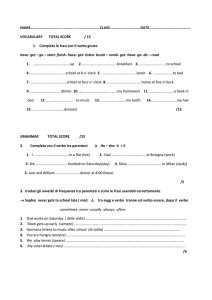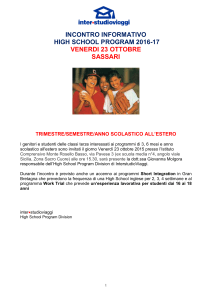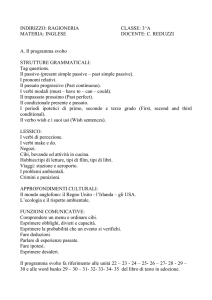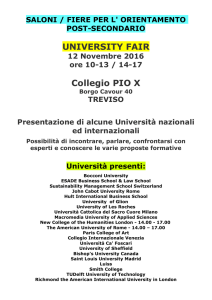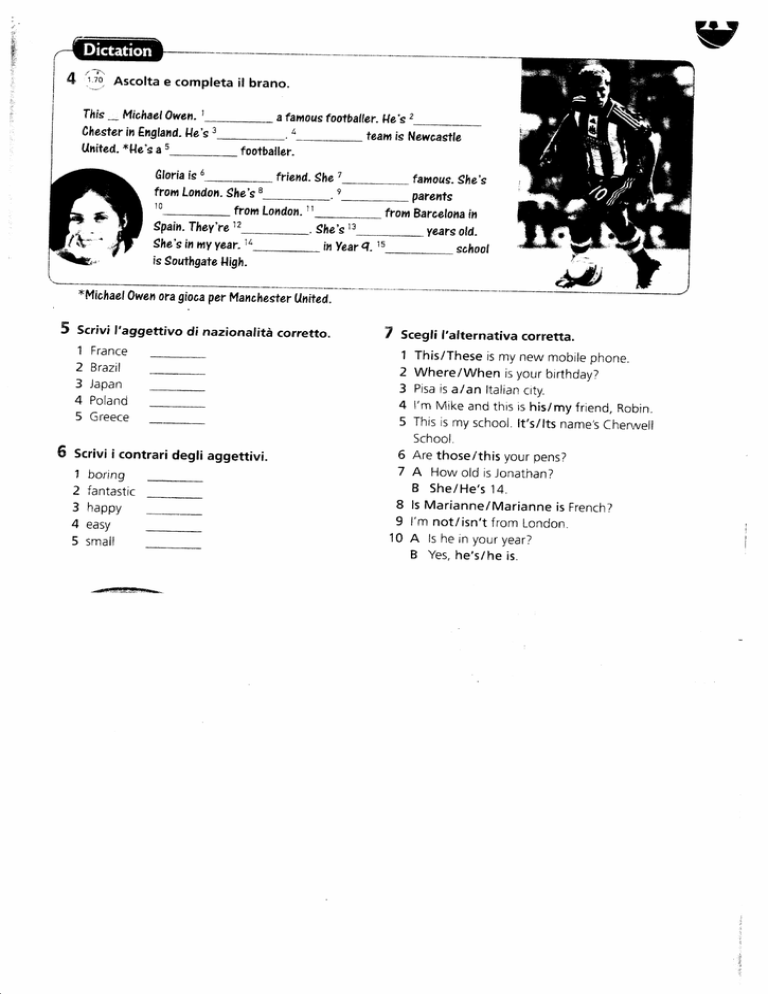
;ii;
.::
4G
Ascofta e completa it brano.
fhfs
- l4iohaelîwan.
Chester in
1
England. Ile's
United.
tlls's
a
5
a famous foatballer.
3
lie's
2
team is Newcastle
faatballer.
friend" She 7_
famous.Sfta's
t.-.
t---from London. She's
parents
r_
fram
London.
ftom
Barcalana in
'0_
Spain.They're i2_
years old.
" She's,r_
tu_
yearq.
She's in ny yean,u_
in
schaal
Gloria is
ó
1
is Southgate lligh.
xî4ichael}wen ora gioca
per î4anchester United.
5
Scrivi I'aggettivo di nazionalità corretto.
Y
Scegli l'alternativa corretta.
1
France
2
1 This/These
Brazil
3
Japan
2 Where/When is your birthday?
3 Pisa is alan ltalian city.
4 l'rn Mike and this is his/my friend, Robin.
5 This is rny school. lt,s/lts name,s Cherwell
4 Poland
5
Greece
6 Scivi i contrari degti aggettivi.
1 boring
2 fantastic
3 happy
4 easy
5
small
is my new mobile phone.
School.
6 Are thoselthis your pens?
7 A Hcw old is Jonathan?
B She/He's 14.
8 ls Marianne/Marianne is French?
9 l'm not/isn't from London"
10
A
B
ls he in ycur year?
Yes, he's/he is.
i*F+,*'G:ì!lCs*b*
i
2
EI Present simple
pronuncia in modi diversi:
con un suono dolce lzl dopo un altro
suono dolce (consonanti sonore e vocali)
I
you
he
she
it
we
you
they
sossen"
.
1 ll
goes /gauzl
play
play
con un suono aspro /s/ dopo un altro
suono aspro (consonanti sorde)
starts /stc:ts/
tnfine la parola -es si pronuncia con un
suono dolce lul"
teaches ltí{tzl
plays
plays
plays
play
play
play
.
:."1T:,1T"
Gl Adverbs of freguency
|:;il j11i111"*,
afways
usually
often
sometimes
rarefy
never
Present simple dei verbi ha un'unica forma
per tutte le persone ad eccezione della
terza persona singolare (he, she, rt) dove si
aggiunge una -s.
2 ll Present
La -s della terza persona singolare si
simple si usa per parlare:
di abitudini
sempre
di solito
spesso
qualche volta
raramente
(non) mai
Gli awerbi di frequenza si usano per dire
quante volte si compie un'azione. Di solito
vengono messi fra il soggetto e il verbo.
I often go to the cinema.
Vado spesso al cinema.
Ma con il verbo be si mettono dopo il verbo.
He's always at horne.
She plays tennis every weekend.
Gioca a tennis tutti i weekend.
defla routine quotidiana
I get up at seven o'clock in the morning.
Mi alza a//e seffe del mattino.
di situazioni permanenti
They work in London.
È sempre a casa.
Lavorano a Londra.
In ingfese non sono possibili due negiazioni
neffa stessa frase, quindi never è sempre
inserito in una frase con il verbo alla forma
affermativa.
My dad never watches TV.
Mio papà non guarda mai la televisione.
di orari (scolastici, dei treni, ecc.)
School begins at nine o'clock.
La scuola inizia alle nove in punto.
Gl Present simple
Per la terza persona singolare,
nell'aggiungere la -s si tiene conto delle
seguenti regole ortografiche:
Ai verbi che terminano in ch, s, sh, x, z, a
o si aggiunge -es.
he
.9
(u
>
E
o
I
!
E(u
E
c
f
teaches it washes
Nei verbi che terminano in -y preceduta
da consonante la -y diventa i e si
aggiunge -es.
she studies it flies he tidíes
Ai verbi che terminano in -y preceduta da
vocale si aggiunge semplicemente una -s.
he plays
î48
she goes
EI Prepositions of time
1
On si usa con i giorni della settimana e le
date.
We go to the supermarket on Saturdays.
Andiamo al supernercato il sabato.
My birthday is on the 12th July.
ll mio campÍeanno e il '12 luglio.
2 At
si usa con le ore e con le
e night.
parole weekend
2
The film starts at four
o,clock.
ll film tnizia alle 4.
I get up late at the weekend.
Mi alzo tardi il fine settimana.
Babies often cry at night.
I bebe spesso piangono di
quarter past {two) le (due)
e un quarto
quarter to (two) un quarto
alte (due)
five, ten, twenty, twenty-five
past
notte.
3 [n si usa con le parti del giorno,
stagioni e gli anni.
I don't watch TV in
the morning.
Non guardo la W di mattina.
fhe school trip is in March.
{two)
le (due) e cinque, dieci,
veÀti, venticinque
i mesi, le
five, ten, twenty, twenty_five
to (two)
cinque, dieci, venti, venticínque
alle (due)
five
La gita sco/asfr'ca è a
marzo.,
fen to
I
twenty to
The dme
1
-
twenty-fiv e
five past
.r-
ìr 12 l
10
quarter to _
93
_84
The London Olymplc Games
are in 2012.
Le Olimpiadi a Londra sono
nel 2Aî 2.
to/
I
-- ten past
2
-quarter
\
oast
twenty past
'twenty-five
past
half past
1 n ínglese si usano raramente
f
le 24 ore
delf'orofogio per parfare derf,ora.
Le 24 ore
defla gíornata sono divise
in due periodi di
dodici ore.
a.m. (ante meridiem) dalle
12 delfa
mezzanotte alfe 12 dí mezzogiorno.
p.m. (posf meridiem)
dalfe 12 di mezzogiorno
alfe 12 della mezzanotte.
o'cfock
to.
\
We go on holiday in the
sumrner.
Andiamo in vacanza rn estafe.
E
Per dire l,ora in ingfese
si usano le seguenti
espressioni:
half past (two) le (due) e
mezzo
3 Si usano fe espressioni in the
morning, in
the afternoan, in the evening
e at nighf per
distinguere le diversi parti
defla giornata.
3 a.m. = lt,s 3 o,clock in the
morning.
3 della maftina.
3 p.m. = ft's 3 o,clock in the
afternoon.
Sono le 3 del pomeriggio.
Sono le
::-::x*:srel:::].*!:k:::::-ry
Daily routines
brush my teeth lavarmi i denti
comb my hair peftinarmi
do my homework fare icompiti
get dressed vestirsi
get home arrivare a casa
get up alzarsi
90 to bed andare a letto
go to school andare a
scuola
have a bath fare
il
bagna
have a shower fare la doccia
have a snack fare uno spuntino
have breakfast fare colazione
have
dinner
cenare
have funch pranzare
fisten to music ascoltare musica
put on hair gef mettere it
put on make-up
wake
gel
truccarsi
up svegliarsi
wash my face lavarmi il viso
wash my hair lavarmi t capelli
c,
sui capeili
watch'fV guardare la tulevisiane
>\
E
,o
-<)
ro
TJ
q,
o
149
2
Completa le frasi con have, go o get'
I have a shower every mornlng'
Daily routines
Scrivi una frase per ogni figura. Usa i verbi
del riquadro.
do mY homework get home get{*P
go to bed Eo to school have a shower
have
breakfast have dinner
have lunch
1 I -2 We
3 I .4 They
5|
5 They
7 You _8 We
9 They
10 l--_-_-
I
to Sutton Park Secondary School'
iunch at school'
to bed at 10 o'clock'
home from school at 4 o'clock'
breakfast in the kitchen'
dinner at a restaurant on Fridays'
uP at 7 o'clock'
a snack in the morning'
to school at 8.30.
dressed in mY bedroom.
getuprt-opartur
t,o geven.
Present simple
.
i: íìj
,'.',: f- r1.íì-i,i.'
iI,,ti
Scegli I'alternativa corretta.
OHe visit my grandparents on Saturdays'
1 Jessica and her family live/lives in Australia'
Z Hei They play tennis every weekend'
3 We/She sPeaks French and German.
4 Our dog PlaY/PlaYs with our cat!
5 My mum and dadlMy dad work in a hospital
6 Robert and I golgoes to martial arts classes'
Completa le frasi con la forma corretta dei
verbi del riquadro.
get*rp like listen live PlaY sleeP
start visit work
He
1
gets up at 6 o'clock.
They
2
3 Our lessons
4 she
tennis after schcol
in a big house
at 8.45 a m
her grandmother at the
weekend
5 We
to music on the Internet.
6 He
in a big bed
7 She
actor
her favourite
8 My parents
Leonardo DiCaPrio. He's
in a shop.
>
(o
(u
-o
(U
.'i
'l
f50
{
'a
g
Present simple
;:"gi rf,lf it:ì
5
;.i
:n.:.;
,ir
ri,ii._
:
l:c
I
Completa le espressioni con en, af o in.
o6 Monday
Scrivi i verbi alla terza persona singolare.
ga goee
4 like
watch
2 study
1
5 write
6 finish
7 get up
1I
3 say
U
Prepositions of time
6u
night
39
/fix/his car in the garage
4
December
2.30 p.m.
5
7o'clock 6
2 .-__- the morning
2009
completa fe frasi con ra forma corretta dei
verbi del riquadro e on, at o in.
be do get-up go
have
(x2)
play
1
My dad gets up
2
Abby/go/to the gym on
They
1
Fridays
at
6.30 a.m.
usually
dinner
2 He always
3
Fridays and Saturdays.
3 My mum s birthday
Leo/read/books in his bedroorn
4 We
4 She/watch /television after schooi
never
5
5
_
night.
lunch at my grandparents,
afternoon.
6 Chrislwrite/emails every evening
10
aunt/teachlFrench
May,
out
house
the weekend.
6l.-myhomework-the
Rosy/do/her homework in the living roorn
7 My
7 p.m.
football
O
Scegli l'alternativa corretta.
8 James/ ii ke/computer games
Adverbs of frequency
Traduci gli avverbi di frequenza e mettiti af
posto giusto nella frase.
Mark goes to the cinema. (spesso)
1
Helen drinks coffee. (maù
2 We watch TV. (raramente)
3 She goes
to bed at 11 p.m. (sernpre)
My dad is a doctor. He sometimes works
night. He t haslhave a shower
at/on 9 30 3 inlat the evening and he
a
goes/gos to the hospital. He 5 works/work
from 11 p.m. until 3 a.m. He 6has/does lunch
7
atlin haff past three s in/at the morningl
He e usualfy finishes/finishes usually wòrk
10
at/on 7 a.m He comes hom'e at 7.30.
He 11 has/have dinner and I i2 have/has
breakfast! Then | 13 go/goes to school and my
dad ia go/goes to bed. When I rs get/have
home from school 16 aUin 3 p.rn. my dad
17
gets up/get ups. He r8 help/helps me with
my homework or we 1e golgoes to the park and
we 20 play /plays football.
@in
2
4 They're at home. (mai)
5
Ihey have lunch at school . (qualche volta)
6 He has a shower before breakfast
-,
I
He s happy (sempre)
8 We play computer games. (spesso)
(di sotito\
>\
rc
c
t5î

